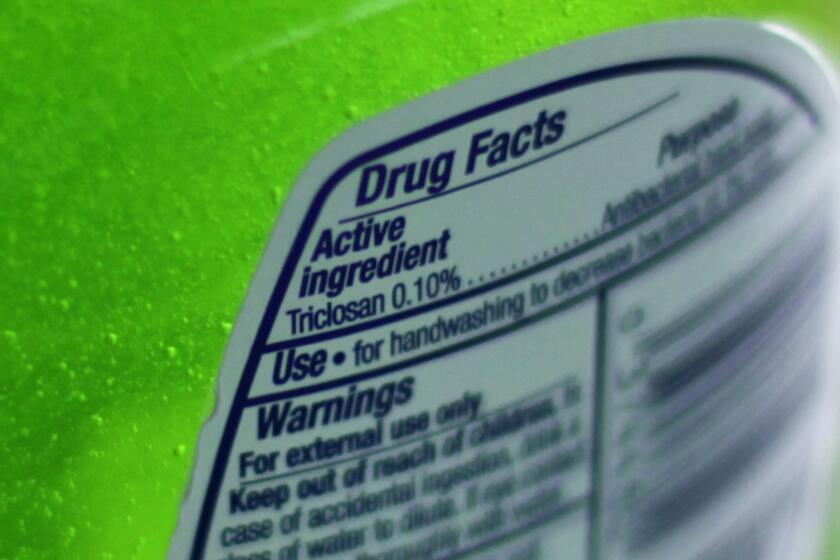Is it responsible to recommend restaurant takeout during the shutdown?
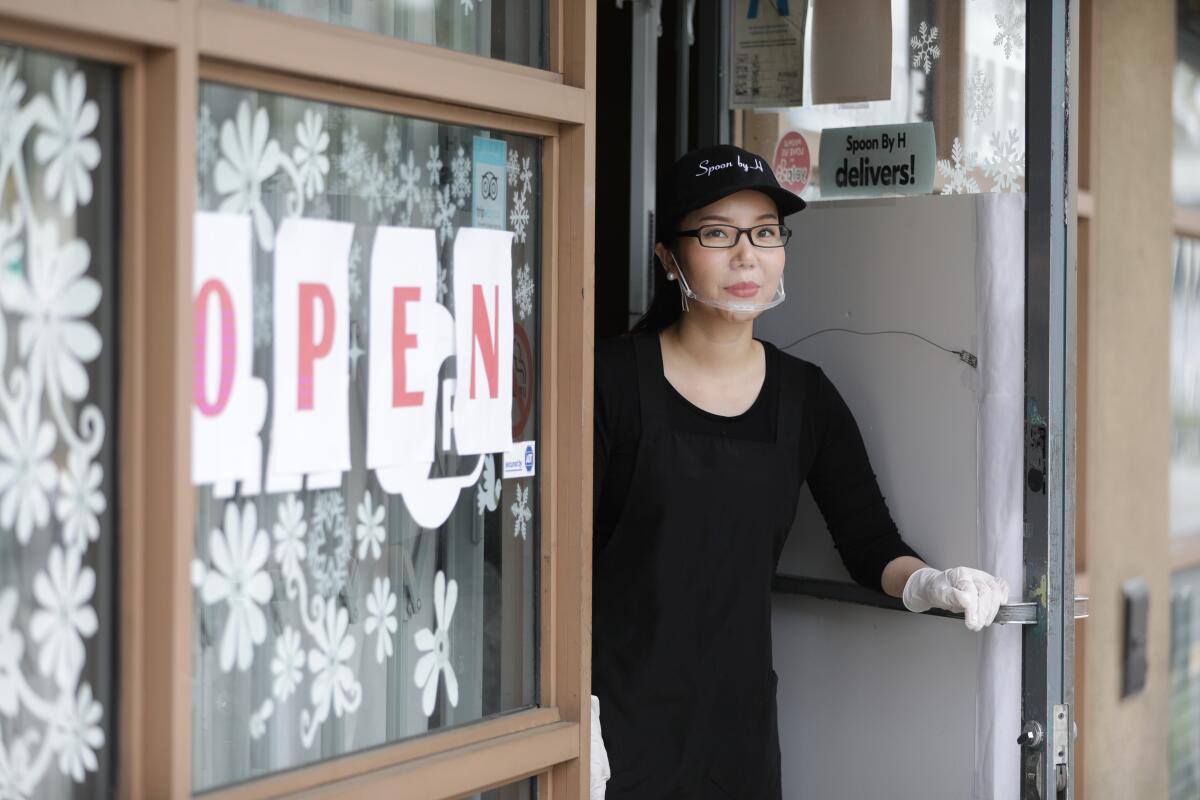
- Share via
Dosirak is a Korean lunch box, served in cafes and carried by generations of elementary-school students and families on picnics. A basic tin might include rice, sliced sausages, fried egg, wisps of seaweed and kimchi. Often one shakes the thing — really puts muscle into it, like a bartender sweating James Bond’s martini — to meld the ingredients into an on-the-go bibimbap.
The $28 dosirak that Yoonjin Hwang conceived recently for takeout at her Beverly Boulevard restaurant Spoon by H is so beautiful it should barely be jostled. It’s a Lite-Brite collage of two dozen small dishes meticulously arranged in a tray with six compartments. Hwang writes descriptions of its ever-rotating contents in black marker on the clear plastic cover: galbijjim, japchae, fish cake, chicken leg, potato salad, pickled peppers with garlic, pineapple salsa. The flavors glow as brilliantly as the colors.
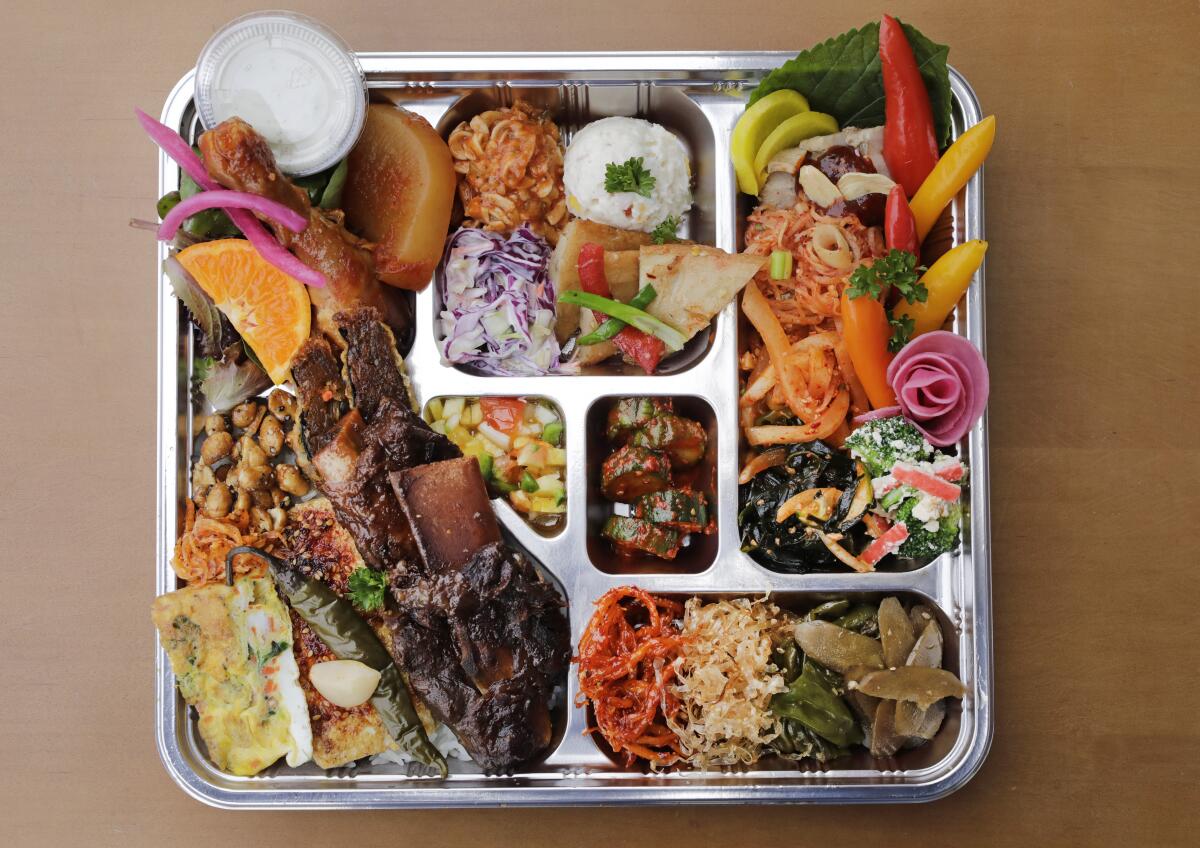
Hwang’s soothing soups and desserts, some of which are also available for carryout, have made Spoon by H a darling among Los Angeles restaurant obsessives. Single-minded food writers, me included, have been quick to post her artful dosirak on Instagram feeds. She is making 50 of them a day and …
OK, let me stop there.
The rave is deserved, certainly. I’ve been seeking out businesses worthy of praise since the day after the shutdown was announced on March 15. The message in my coverage has been implicit: I support restaurants that have remained open for pickup and delivery.
However, a litany of questions plays on an hourly loop in my head. Is this an irresponsible stance? Does a takeout order help an endangered business through one more day, or is it a useless, self-serving, dangerous gesture? Do we support restaurants solely now through merchandise, or online fundraising campaigns, or gift certificates? Is it enough to donate to restaurants partnering with nonprofits that are helping to feed medical workers? Is it better for workers out of jobs to collect unemployment? Do we trust in our government to subsidize or resuscitate these centers of community?
We’ve absorbed messages from officials and medical experts about protecting ourselves and others so deeply we carry their warnings in our constricted, anxious chests. Stay at home. Maintain your distance and wear a mask. Make do with what already you have. Stay put.
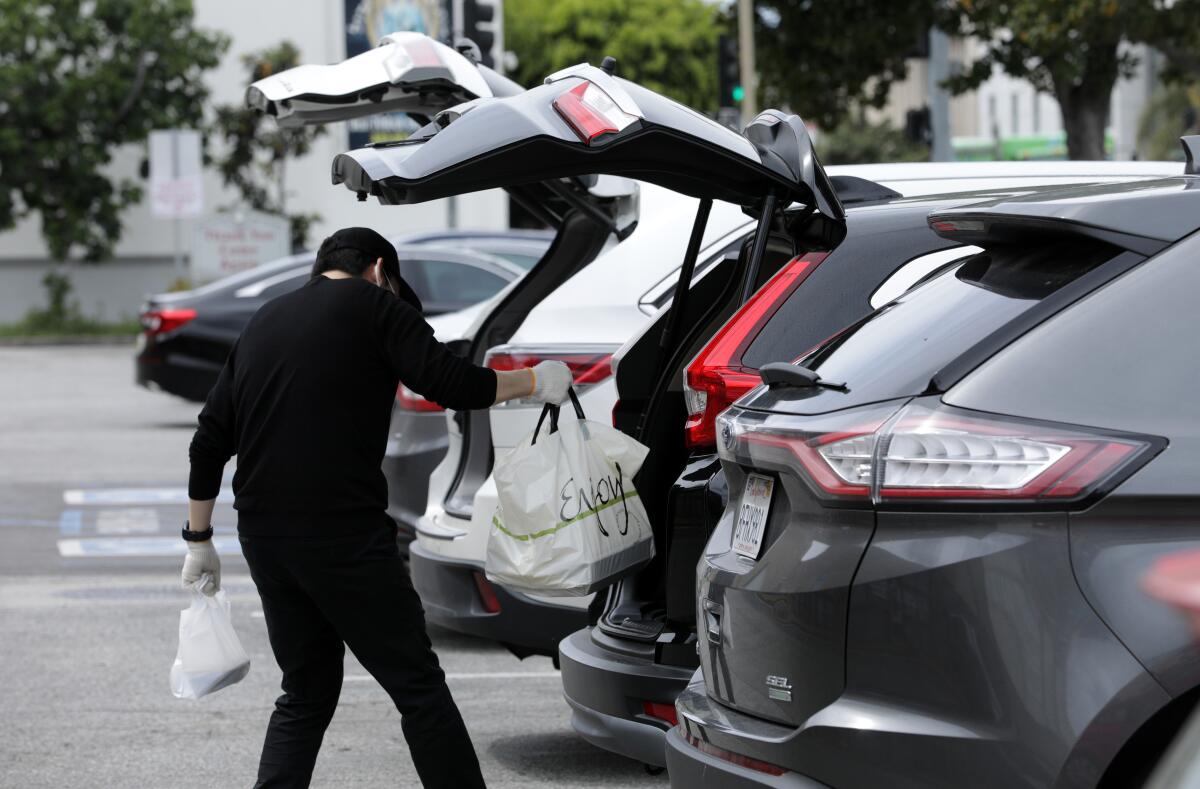
Many chefs and restaurateurs around the country made hard, fast decisions last month: For the health of their teams they closed their businesses. Others winnowed their staff to a skeleton crew, signed up with delivery apps, composed menus of comfort foods while applying for emergency loans and relief funds, pulled together groceries to sell with their wine inventory, struggled with what made sense and what didn’t — and they keep struggling. Every day is a roulette of precarious bottom lines and new protocols and unknowns.
There’s no winning strategy. But, while taking all prescribed precautions, I choose to keep patronizing restaurants.
I requested the dosirak from Spoon by H using a number on its Instagram account; I paid for it via Venmo. In the restaurant’s strip-mall parking lot I identified myself to Hwang’s brother; he put my order in the trunk of my car. Back at home I wiped down the bag and the edges of the tray. The risk felt minimal.
“I’m trying my best and I don’t know what’s going to happen next,” Hwang said later by phone. “If this lasts more than a couple of months, I’ll have to close.”
She estimates that the restaurant is bringing in 25% of the income it generated before the shutdown, when lines trailed out her door. “But I need that quarter anyway,” she said. “I know safety is most important, and I can’t stay at home. I can’t make up my mind. Should I do more?”
She hasn’t aligned yet with a delivery app; she’s aware of the draconian commissions many of the companies charge — up to a 30% cut of the restaurant’s take on every delivery. “Postmates and Grubhub, they keep pushing me,” Hwang said. “Their message is: ‘Without us you won’t survive.’”
(For what it’s worth, the commission-free delivery app ChowNow charges a monthly flat rate and seems to be the fairest option for restaurants; it’s not as well-known in L.A. as, say, Caviar, but I’ve noticed some of the city’s standout neighborhood restaurants increasingly migrating to it.)
Spoon by H has received steady, basking attention over the last couple of years. What about the lower-profile stalwarts still operating?
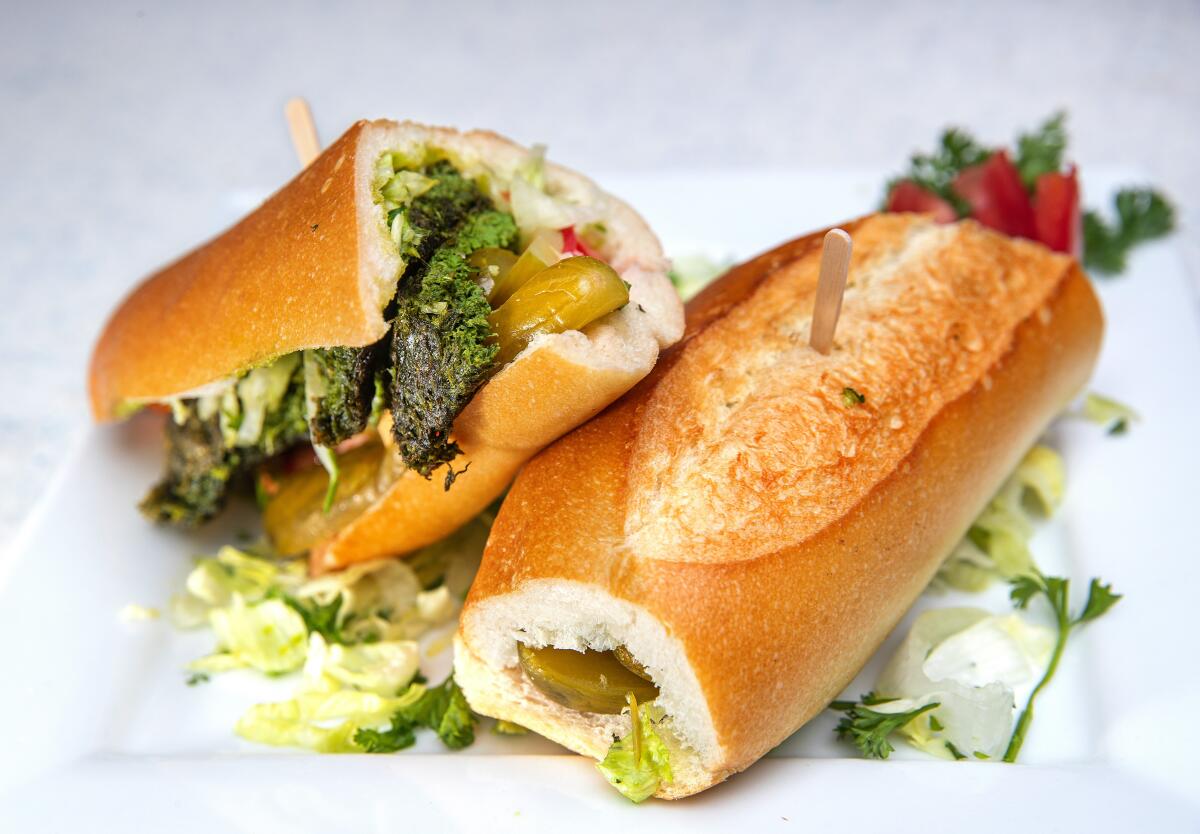
Thinking about lunch one day, I hungered for one of Attari Sandwich Shop’s beef tongue sandwiches, or a helping of the herby frittata-like egg dish called kuku sabzi. Attari is a mainstay of Tehrangeles, as the Westwood-based Iranian community has long been designated, where customers lingered over lunch under umbrellas in its sunny courtyard.
“Carryout was always only 10% to 15% of my business,” owner Mike Bastani said when I phoned the restaurant; his takeout revenue, he noted, remains about the same despite the ban on dining in. “Most of my employees are sitting at home. If it gets worse than this, I’ll close. The good news is that this is a small place. What about all the big kebab restaurants around here? Will they all have to file for bankruptcy?”
Last summer I watched a steady stream of customers roll through Apey Kade, a Sri Lankan restaurant in Tarzana. Takeout for lacy string hoppers and for lamprais, a meal steamed in a banana leaf, appeared brisk.
“Business is very down, very slow,” said chef and co-owner Niza Hashim this week. “I close at 6:30 because there’s nobody on the street.”
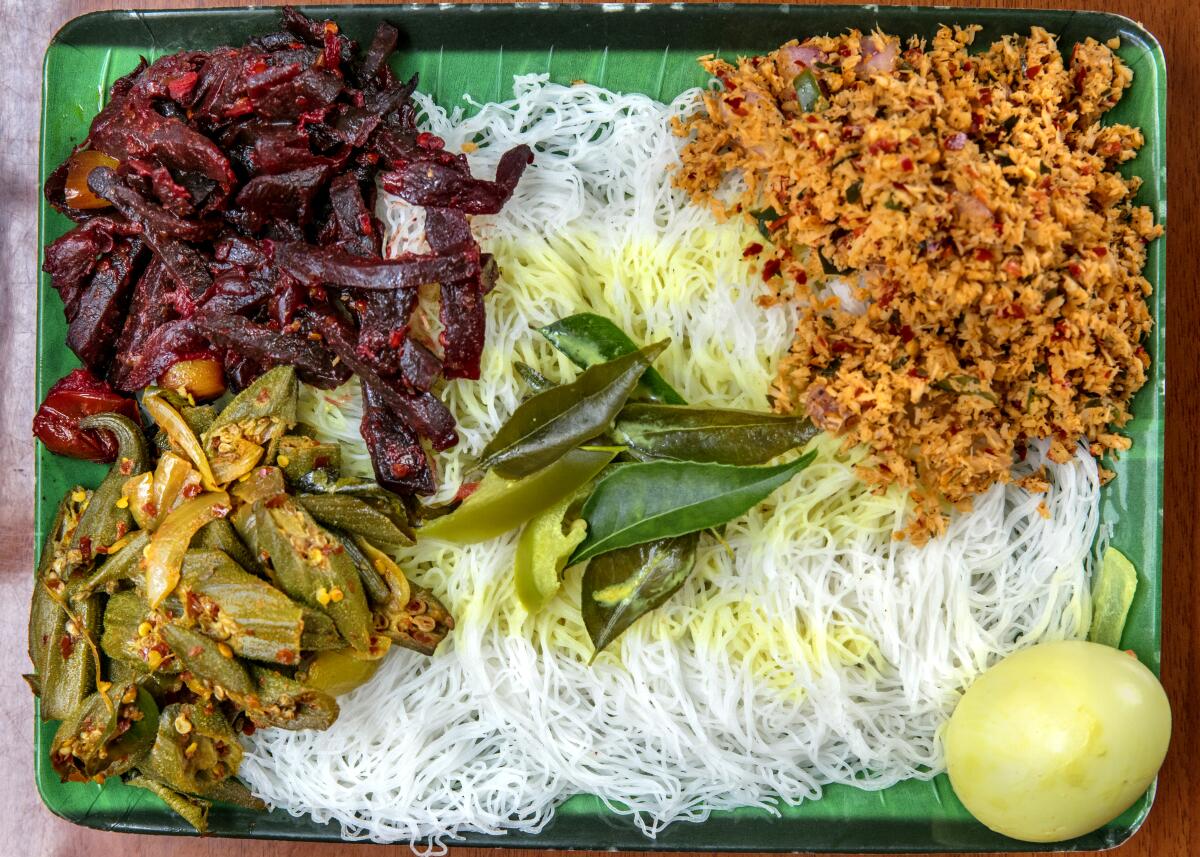
I called Ivan Xiao, who was manager of Alhambra’s Sichuan newcomer Xiang La Hui when I wrote a review in February, a far distant past. The restaurant remains open for takeout but Xiao is no longer employed there. “I’m at home with my family,” he said. “And I don’t know where I’ll go back to work when all this is over.”
The stories become repetitive but never numbing; each one stings afresh.
The stories are why I continue reporting on where and how you can experience uplifting meals from restaurants — even if some places are doomed, even factoring the risks from all sides. I am healthy, as far as I know. I live alone; I have a small circle of friends I see, with an appropriate social distance, who also live alone. Most restaurants or delivery couriers have mastered contactless handoff; I’ve avoided or left a few businesses where people crowded too close.
When I began writing takeout restaurant roundups over the last few weeks, readers in Orange County and the San Fernando Valley quickly wrote in to scold me for not spotlighting enough options for them. Their grumpy emails raise my spirits. People care; they don’t want our dining culture to die, either.
I want to zing you with truer, weightier magical words. I don’t have them. I don’t know much right now; at my best I’m making peace with not knowing.
Rossoblu, Steve Samson’s downtown Italian restaurant, started offering takeout a few days ago after being closed for several weeks. I’m about to order two of his best dine-in dishes, Parmigiano Reggiano dumplings in brodo and lasagna Bolognese. I’ll tell you how they are as takeout shortly.
Contrary to viral videos, the FDA says to not use dish soap to wash fruits and vegetables because soap is not meant for human consumption and could make you sick.
More to Read
Eat your way across L.A.
Get our weekly Tasting Notes newsletter for reviews, news and more.
You may occasionally receive promotional content from the Los Angeles Times.
